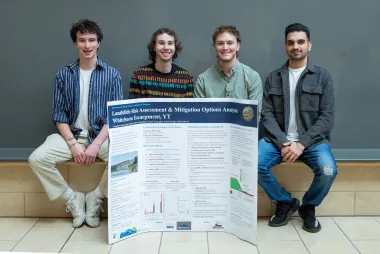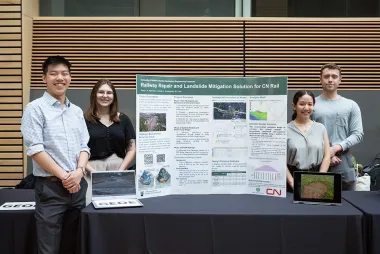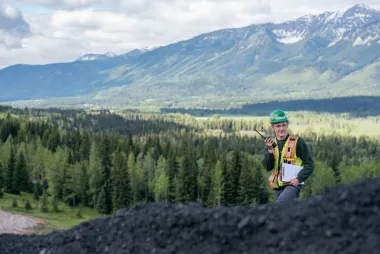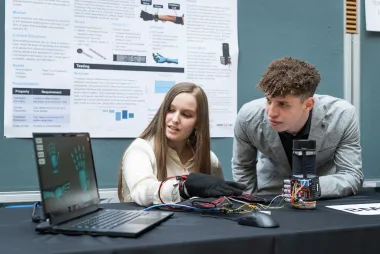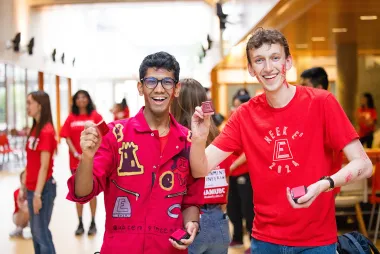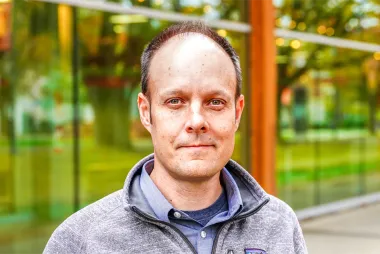
If you are passionate about the Earth and intrigued by digging deeper, you may thrive as a geological engineer.
Employed by consulting firms, government agencies and large corporations, geological engineers use their knowledge of earth sciences to determine how engineering projects will impact the soil, rock and water in their environ, and vice versa. For example, geological engineers may design foundations for buildings or select routes for linear infrastructure (railways, roads, pipelines and so on) to avoid hazardous terrain. They investigate geohazards (flooding, landslides, soils liquefaction) and design mitigation strategies to protect people and properties. Some geological engineers devise contaminated site clean-up strategies, and design groundwater-sourced drinking water systems for remote communities. Others design safe slope cuts for highways, mines or other excavations, or design dams for hydroelectric projects, drinking water reservoirs or containment of waste products.
UBC’s Geological Engineering program prepares students for a variety of exciting careers that often involve travel and site investigations in far-flung locales, as well as exposure to state-of-the-art engineering software and other tools.
In collaboration with the Faculty of Science, the program blends aspects of earth sciences, civil engineering and mining engineering with a fundamental understanding of the Earth’s surface and subsurface environments.
Vancouver Campus
Learn more at You UBC's program page or visit us at geoeng.ubc.ca
Why study this program
Geological Engineering graduates are well positioned to start successful careers in the environmental, geotechnical, energy or resource sectors. Common areas of focus they pursue include: sustainability, natural resources, earth sciences, tunneling, mining, construction, geotechnical engineering and environmental cleanup.
Courses & specializations
Students will first complete a foundational first year of engineering and then take specialized courses beginning in second year, once they are placed into their engineering discipline.
Geological Engineering students can tailor their undergraduate degree to their personal interests through taking courses relevant to the following general areas:
- Geotechnical
- Environment
- Natural Resources
Sample courses
| Year 2 | |
|---|---|
| EOSC 210 | Earth Science for Engineers |
| CIVL 210 | Soil Mechanics I |
| EOSC 220 | Introductory Mineralogy |
| EOSC 240 | Site Investigation |
| Year 3 | |
|---|---|
| CIVL 316 | Hydrology and Open Channel Flow |
| EOSC 323 | Structural Geology I |
| EOSC 330 | Principles of Geomorphology |
| EOSC 350 | Environmental, Geotechnical and Exploration Geophysics |
| MINE 303 | Rock Mechanics Fundamentals |
| Year 4 | |
|---|---|
| CIVL 410 | Foundation Engineering I |
| EOSC 429 | Groundwater Contamination |
| EOSC 433 | Geotechnical Engineering Practice |
| EOSC 434 | Geological Engineering: Soils and Weak Rocks |
| EOSC 445 | Engineering Design Project |
For a more in-depth look at the curriculum, please consult the Academic Calendar and course descriptions.
Enhance Your Education (further education)
Geological engineering graduates looking to continue their education can pursue professional programs and graduate studies, such as a Master of Engineering (MEng, a course-based, non-thesis graduate degree) or a Master of Applied Science (MASc, courses and a thesis). The analytical and problem-solving skills students gain from the geological engineering undergraduate degree also translate well into the qualities needed for entry into Medical or Law School, or for a graduate degree in business (e.g., MBA). Our students also make strong candidates for UBC’s Master of Engineering Leadership in Clean Energy Engineering, Integrated Water Management, or Sustainable Process Engineering, which offers the unique combination of business and engineering courses for students looking to further their studies in sustainable solutions.
Careers
With a mean base salary of $100,073 (source) for Geological Engineers and an expected employment growth rate of 1.5% over the next 5 years (source), our graduates are well equipped to pursue careers in a wide range of sectors (source). Common career titles (source) for geological engineering graduates include: Geological Engineer, Geotechnical Engineer, Soils Engineer, Geophysical Engineer, Rock Engineer, Hydrogeologist and more. Depending on their choice of electives, graduates of UBC’s Geological Engineering Program are uniquely positioned to qualify for registration as both Professional Engineers and Professional Geoscientists with Engineering and Geoscientists BC.
Employers
Both current students and graduates are able to work for a wide range of employers, from consulting firms to contractors, from education and/or research institutions to resource extraction companies, as well as crown corporations (e.g., BC Hydro) and various other types of governmental organizations. Some of the biggest employers of UBC geological engineering students over the past several years have included: BGC Engineering, Golder Associates, Klohn Crippen Berger, Piteau Associates, Conetec, BC Hydro and Peace River Hydro Partners.
Alumni
Design Teams & Clubs
Design Teams
There are over 30 Engineering Design Teams at UBC. Joining an engineering design team is an excellent opportunity for students from all disciplines to collaborate on a wide variety of design projects and gain relevant teamwork, leadership, and technical skills transferrable to future careers. Our students have participated on various design teams, including those that may not seem, at first glance, directly related to geological engineering. For example:
See the full list of UBC’s Engineering Design Teams.
Clubs
There are many ways engineering students can get involved, including joining clubs relevant to their discipline. Clubs particularly ;geared toward to Geological Engineering include: GEOROX, a club to which all students in the Geological Engineering Program belong; and Canadian Geotechnical Society UBC Student Chapter.
Research
Research areas of interest of faculty members in the Geological Engineering program include landslides, debris flows, groundwater contamination & remediation, rock mechanics & rock engineering, and tunneling. Undergraduate students are encouraged to consult individual faculty members for more information about their current research areas.
Minors & Dual Degrees
Engineering students are able to complement their studies with 5 Minors available or a Dual Degree with Arts. Students interested in a minor can apply to their chosen option in their third year of study. A minor or dual degree will likely extend your degree past 4 years.
Co-op
Participation in the Engineering Co-op Education program gives students the opportunity to gain up to 20 months of paid relevant work experience during their degree. This experience provides an excellent opportunity for students to explore different industries, apply their studies to the working world, and create connections with future employers. The Co-op program will extend your four-year degree to five years. Participation is optional and students apply to join Co-op in their second year of study.
International experiences
Students can embark on an unforgettable experience abroad while earning credits towards their engineering studies. Opportunities include the Coordinated International Experience (CIE) exchange program, the Go Global exchange program, and the Global Engineering Leadership courses. The CIE program is customized for Applied Science students and features 18 international partner institutions across 3 regions. All of the international experiences allow students to build an international network of peers, professors, and potential employers.



